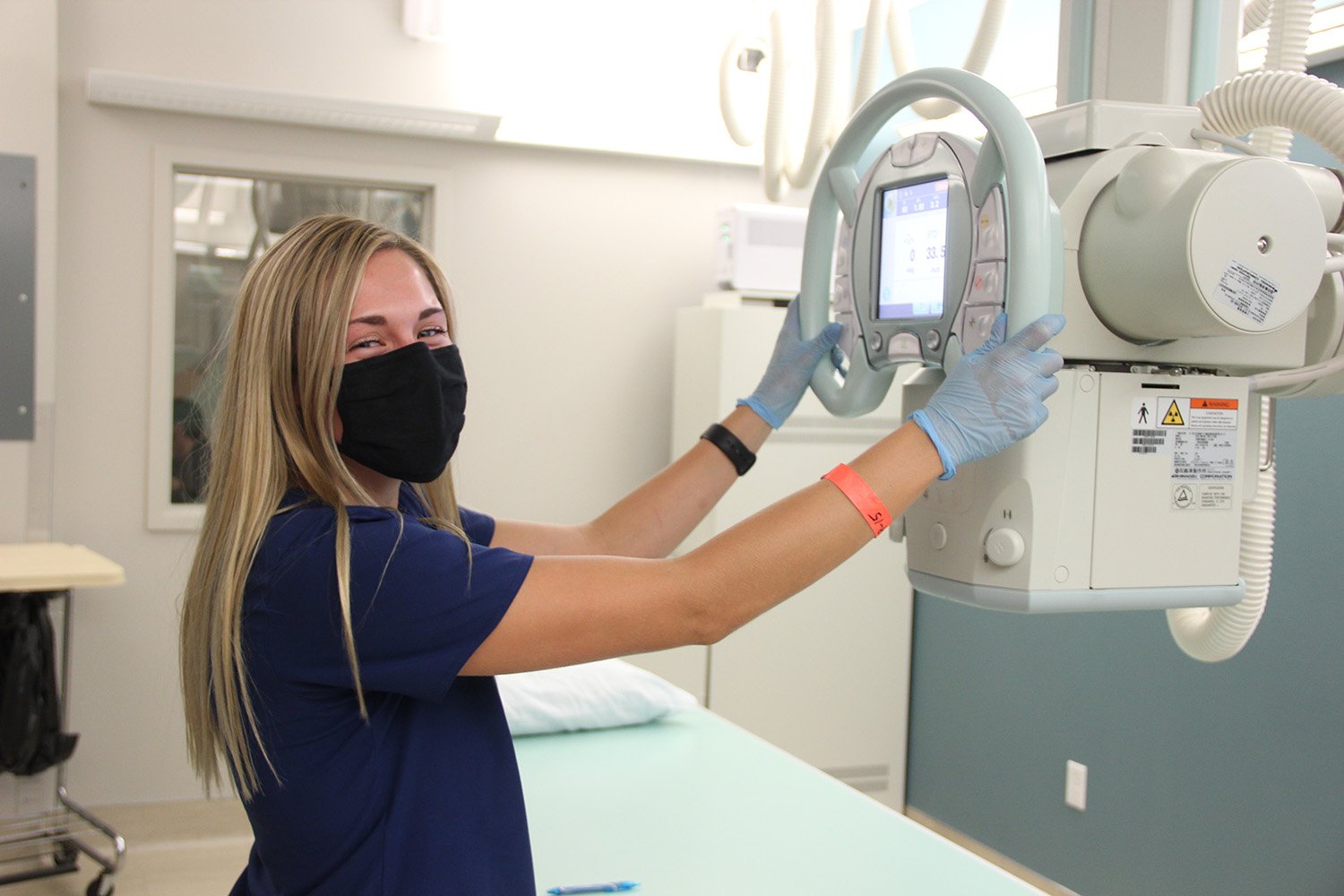
Radiological Technology PROGRAM
> PROGRAMS > HEALTH SCIENCES > RADIOLOGY
RADIOLOGY
PROGRAM
The Radiology program is offered on the Gainesville Campus. Classes are on campus with clinical training at area hospitals. The curriculum consists of classroom lecture, skills lab, and clinical practicum components. The classroom instruction as well as supervised clinical experiences will assist you in acquiring the knowledge and skills to function as a beginning practitioner of radiography.
After successful completion of all program requirements, you’ll be qualified to take the national certification examination administered by the American Registry of Radiologic Technologists (ARRT). Those who pass the examination are issued certificates which confer the right to use the title "Registered Technologist in Radiography" and its abbreviation "R.T. (R), ARRT" after their names. Additionally, graduates may be eligible for licensure by the Texas Medical Board as a Medical Radiologic Technologist. Then you can get to work.
Earn your Associate of Applied Science (AAS) Degree in Radiology in as little as 2 years. Radiologic technologists use x-ray equipment to create images of the internal body to diagnose injury and disease. Services are performed at the request and under the supervision of a physician. They may perform basic radiographic duties independently or may assist physicians in more complex situations. Opportunities for cross-training and continuing education with a Bachelor of Science Degree, Radiologist Assistant Post Baccalaureate Certificate, or a Master of Science Degree all exist for a Radiologic Technologist.
Radiology Program
Overview
-
It is the mission of the Radiography Program to deliver quality education that provides the means for each student to gain and apply the knowledge and skill necessary to be successful in the field of radiography.
Program Goals & Student Learning Outcomes:
STUDENTS WILL BE CLINICALLY COMPETENT
Learning Outcomes:
Students will apply positioning skills.
Students will select appropriate technical factors.
Students will practice radiation protection.
STUDENTS WILL COMMUNICATE EFFECTIVELY
Learning Outcomes:
Students will effectively communicate with patients.
Students will demonstrate effective presentation skills.
Students will demonstrate written communication skills.
STUDENTS WILL USE CRITICAL THINKING AND PROBLEM-SOLVING SKILLS
Learning Outcomes:
Students will perform non-routine examinations.
Students will evaluate images (Ones they didn’t produce)
STUDENTS WILL GROW AND DEVELOP PROFESSIONALLY
Learning Outcomes:
Students will demonstrate professional behavior.
Students will understand ethical decision skills.
THE PROGRAM WILL GRADUATE ENTRY LEVEL TECHNOLOGISTS
Learning Outcomes:
Students will complete the program.
Students will be satisfied with their education.
Graduates will pass the ARRT national certification on the 1st attempt.
Of those pursuing employment, graduates will be gainfully employed within 6 months post-graduation.
Employers will be satisfied with the graduate’s performance.
-
The radiography program is accredited by the Joint Review Committee in Education in Radiologic Technology.
Joint Review Committee on Education in Radiologic Technology
20 North Wacker Drive, Suite 2850
Chicago, IL 60606-3182
312-704-5300
Email: mail@jrcert.orgThe program's current accreditation award is 3 years. General program accreditation information and the current accreditation award letter can be found here.
-
This handbook contains general rules, policies, and regulations. Keep this handbook with you for reference. College rules and regulations are made to assure fairness and uniformity for all students. This handbook is to be part of the clinical as well as didactic portion of your training and experience in the program. The information contained in this handbook is specific to the Radiological Technology Program and serves as a supplement to the NCTC Student Handbook as well as the Policy and Procedures Manual of each clinical affiliate. The information provided in this handbook must be read and compliance with listed policies is mandatory. It is also the responsibility of the student to thoroughly read and utilize the information on an on-going basis throughout the entire program
-
Students who are admitted to the program:
Must pass a Background and Drug Screening prior to clinical rotations
Must be CPR certified for the Healthcare Provider.
Must have a physical examination completed by your private physician.
Must provide documentation of immunizations and hepatitis B vaccines.
Must have personal Medical Insurance (Liability insurance is provided by the school)
Must go to clinical site selected by the Clinical Coordinator
Radiological technology students are required to provide a completed physical examination form prior to admission to the program. Each student must also provide documentation demonstrating that the student is in compliance with the immunization requirements for students enrolled in health-related career education courses as set forth by the Texas Department of State Health Services.
Tetanus/Diphtheria booster must have been within the past 10 years.
Measles For students born on or after January 1, 1957, verification of 2 doses of measles vaccine administered on or after their first birthday and at least 30 days apart or serologic confirmation of immunity is required. Students born prior to January 1, 1957 must show proof of either, one dose of measles vaccine on or after their first birthday, and since January 1, 1968 or serologic confirmation of measles immunity.
Mumps: Students must show documentation of one dose of mumps vaccine administered on or after their first birthday or a physician-validated history of mumps illness or serologic confirmation of immunity.
Rubella: Students must show documentation of one dose of rubella vaccine administered on or after their first birthday or a serologic confirmation of immunity. A physician-validated history of rubella is not acceptable documentation of immunity.
Hepatitis B: Students must show they have received the entire Hepatitis B series or serologic confirmation of immunity.
Varicella: Students must show documentation of immunization history or serologic confirmation of immunity to varicella (chicken pox)
Tuberculin test: Students must have 2 negative TB tests within 3 weeks.
Flu vaccination: Students must show documentation of one dose of the flu vaccine administered seasonally. Should any student elect to not receive the vaccination, he/she will be required to wear a mask during any and all patient contact in the clinical setting.
Clinical agencies may require additional tests prior to using their facilities.
Students are responsible for all financial obligations incurred with any illness/accident. Clinical facilities require proof of major-medical insurance. A copy of the insurance face sheet must be submitted upon acceptance into the program. A student will not be permitted to attend clinical if this documentation is not available.
As of August 2022, clinical sites are located in Gainesville, Denton, Dallas, Ardmore, Nocona, Decatur, Southlake, Irving, Carrolton, Frisco, Euless, and Plano. I understand I may have to drive anywhere up to 2 hours each way, 3-4 days a week to my designated clinical site.
More information may be found in the Clinical handbook.
-
Students scoring the highest Total Admission Points will be admitted to the AAS Radiology Program. Applicants will be ranked according to the TEAS score + priority points total. The program accepts the maximum of 20 students. Remaining candidates will be listed as alternates. If any admitted candidates aren’t able to begin the program for that particular semester, the next highest scoring alternate will be admitted. Any applicant (including alternates who did not get in) wishing to reapply the following semester must go through this admission procedure again. Those students accepted for admission to the Radiology Program will be registered in the first semester radiology courses by NCTC.
Prerequisites (14 Credit Hours) - Must be completed by the spring semester you are applying.
BIOL 2401 - Human Anatomy and Physiology I
BIOL 2402 - Human Anatomy and Physiology II
ENGL 1301 - Composition I
MATH 1314 - College Algebra or MATH 1342 - Elementary Statistical Methods
Co-Requisites- Strongly encouraged to completed by spring semester you are applying
PSYC 2301 - Introduction to General Psychology
One Course from Language, Philosophy & Culture or Creative Arts Core
Non-Radiology Curriculum Coursework Point Average (pre-requisites and co-requisites must be completed by the semester you are applying)
4.0 - 3 priority points
3.5 - 2 priority points
3.0 - 1 priority point
BIOL 2401 Anatomy & Physiology I Grade
A - 3 priority points
B - 2 priority points
C - 1 priority point
Non-Radiology Coursework Completed with a “C” or better (pre-requisites and co-requisites)
16 hours - 3 priority points
10 hours - 2 priority points
4 hours - 1 priority point
BIOL 2402 Anatomy & Physiology II Grade
A - 3 priority points
B - 2 priority points
C - 1 priority point
ADMISSION
STEPS
Enrollment begins January 21, 2025 to May 31, 2025 for Fall 2025 class start. The Radiological Technology Program will accept a maximum of 20 students each semester.
-
-
These are scheduled each spring semester. The dates will be listed under Events as soon as they are scheduled. Most applicants find these group sessions to be very helpful and informative, and those attending are given the chance at the end of the session to ask questions. An alternative to in-person information is the online version (see above).
You must “attend” an information session the same calendar year as the application to enroll in the radiology program. Attendance does not carry over to subsequent years.
-
Once all admission requirements are met, you will be notified by the Admissions Office of your acceptance to NCTC. You may meet with your success coach/advisor and begin registering for the pre-requisite and general academic courses if needed. See the Radiology degree plan.
-
Next, schedule, register, and pay for your Allied Health TEAS test at the ATI/TEAS testing site then with the Testing Center on your campus. ALL applicants are to take the exam prior to June 1. Students may take the TEAS test twice in a calendar year. The highest score will be used towards their application. For more information go to nctc.edu/testing/ati or email corinthtesting@nctc.edu.
If you have a disability, contact the Office for Students with Disabilities (OSD) to obtain information about available testing accommodations and procedures.
-
Login to the MyNCTC
Under Student Services > Radiology Program select Apply.
Fill out all sections the form and attach copies of your transcripts and your TEAS scores.
Submit the application.
Your application will then be evaluated to determine admission. Applicants will be ranked according to the TEAS score + priority points total. The highest ranking applicants will be invited into the Radiology Program.
Transcripts need to be evaluated for transfer in credit. If you completed courses at another college or university, you will be required to have your official transcripts evaluated. This process takes 4-6 weeks to complete.
All applicants who have submitted a Declaration of Intent form will be notified of their testing status BY EMAIL — no later than July 1 preceding each Fall Semester.
-
Any student who has a history of mental illness or substance abuse or who has been convicted of a felony must file paperwork with the American Registry of Radiologic Technologists before entering the Radiology Program. ARRT regulations stipulate that a person convicted of a felony may not be permitted to take the licensing exam. Don’t spend two years in school and then discover that you cannot take the exam. Check it out beforehand! Any student who has ever been arrested for anything other than a minor traffic violation will need to submit a Petition for a Declaratory Order to the ARRT. Contact the Radiology Department for more details.
Criminal background checks will be completed on all applicants to the program. The following histories will disqualify an individual from consideration for clinical rotations:
Felony convictions
Misdemeanor convictions or felony deferred adjudications involving crimes against persons (personal or sexual)
Felony deferred adjudications for the sale, possession, distribution, or transfer of narcotics or controlled substances
Registered sex offenders
The Health Science Programs at NCTC require a large time commitment from the student. Check the mock-schedule we created for this program to find out if this program is right for you!
Career Outlook
Mammography, CT, MRI Technologist
Bone Densitometry

